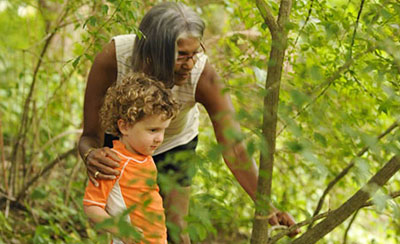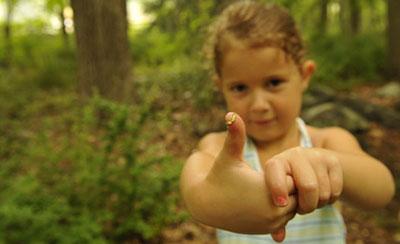Co-exploring
An important part of outdoor exploration
| May 2016In order to fully embrace what we see as an important component of outdoor exploration, namely co-exploration, you need to leave the formal instructive style of teaching at the door. In other words if you want to transform your outdoor sessions into genuine opportunities for co-exploration it is really important that you too are actively engaged in learning alongside your children, i.e. you are no longer the sole leader/teacher/expert. This does not, of course, mean that you have to leave behind all your knowledge and experience of the outdoors or indeed that your sessions have to be unstructured per se. It does, however, require you to be confident enough to step back and allow the children to have opportunities to dictate the nature and pace of the session within your pre-determined safety boundaries. You then use your knowledge and experience to decide when to step-in, for example, in helping children to learn how to identify a particular animal or plant that has taken their interest if they don’t already know what it is.
Taking children outdoors and providing them with more freedom than perhaps they may be used to experiencing, to explore and interact with the natural environment, can sometimes, however, be a nerve-wracking business, especially if your knowledge of the children and/or of the site is still under-development, or if it is different from other roles you may have in school. A good example of this is highlighted in the following diary entry:
“One of the teaching assistants mentioned today how being outdoors has shown her that you can have fun if you’re properly dressed. She said that she’s learning to stand back and observe the children much more through these outdoor exploring sessions, something which she said as a teaching assistant and lunchtime supervisor, she doesn’t always feel able to do.”
As adults there can be a temptation to want to keep stepping in, to hover around the children and/or to blatantly interfere. As Bruce (2005) discusses, we need to interact not interfere, and there is skill in adults learning and then knowing when to do the former and not the latter, with practise improving the skill. However, if you have, or can develop, the confidence to take a step back, to see these outdoor exploration sessions as golden opportunities for children to experience some genuine responsibility; to learn to self-assess risk; to interact appropriately with their peers and their surroundings, you will be helping to build their confidence, equipping them with a huge range of lifelong learning skills as well as giving yourself an opportunity to learn more about your children in your outdoor setting. In fact when Year 6 children were asked about their experiences they said:
“It’s a different kind of education” and it helped them to develop the following skills: “Makes us well rounded; gives us confidence; makes us think logically e.g. the den building; makes you realise what you can do.”
A list of some of learning observed in children exploring outdoors.
- Listening, really listening and focussing on the sound or speech for a period of time
- Looking, taking time to look and observe and consider and making judgments based on those observations
- Explaining what something is, how it got there, facts about the animal or plant, living and survival conditions
- Understanding and appreciating cause and effect, with for example regards to oneself – well wrapped up and you keep warm and regards the environment – don't stamp on insects as they are living creatures
- Surviving and triumphing over the weather
- Taking risks and trusting one's own judgment
- Conquering fear
- Using one's imagination to design and sustain play situations including the symbolic representation of natural materials
- Learning to challenge oneself physically, academically, emotionally
- Dealing with failure (e.g. den collapsing – wood too heavy) and opportunities to achieve (building den with more appropriate structure)
- Learning about life and death in nature
- Learning about transformations in nature: for example, seeing the development of tadpoles into frogs in the wild, which helps contextualise in-class learning
- Learning to respect and care for the environment...
Excerpt from Exploring Outdoors Ages 3-11 .







